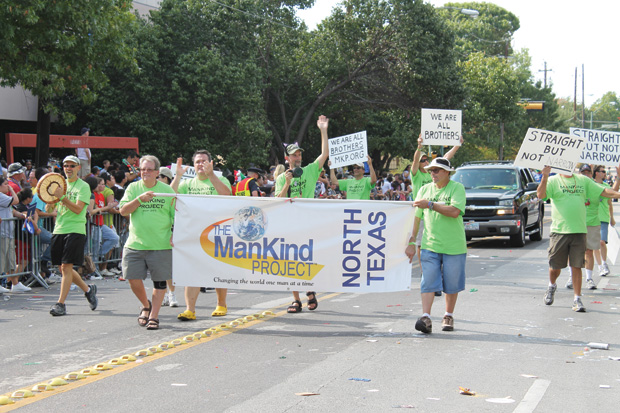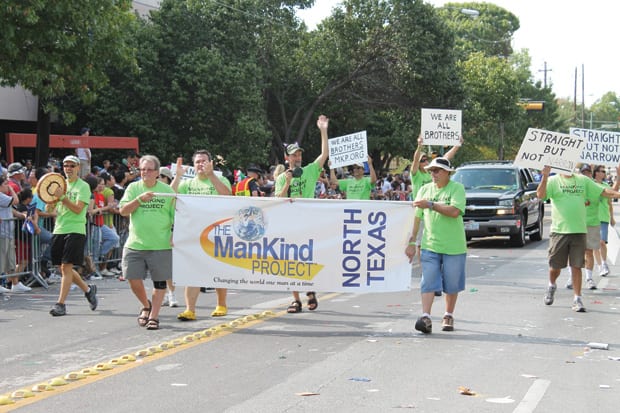Once accused of backing ‘ex-gay’ therapy, group now offers ‘New Warrior Training Adventure’ geared specifically toward GBTQ men

ROAD WARRIORS | The 27-year-old ManKind Project has over 50 centers in the U.S., including one in North Texas. This year will be the group’s third Alan Ross Texas Freedom Parade. (John Wright/Dallas Voice)
DANIEL VILLARREAL | Contributing Writer
editor@dallasvoice.com
 Amid the papier-mâché floats, the bead-tossing drag queens and the scantily clad dancers in this year’s Alan Ross Texas Freedom Parade, you’ll again see members of The ManKind Project, or MKP, an international men’s organization that has at times received negative media coverage and even harsh criticism from gay activists.
Amid the papier-mâché floats, the bead-tossing drag queens and the scantily clad dancers in this year’s Alan Ross Texas Freedom Parade, you’ll again see members of The ManKind Project, or MKP, an international men’s organization that has at times received negative media coverage and even harsh criticism from gay activists.
The MKP — which has more than 50 centers in North America, Europe, Africa and Australia — supports “men in leading meaningful lives of integrity, accountability, responsibility, and emotional intelligence.”
Toward this end, it offers “New Warrior Training Adventure,” or NWTA, a weekend of tribal initiation rituals that challenges men to heal emotional wounds and overcome self-destructive behaviors.
Over the MKP’s 27-year history, it has sent more than 48,000 men to the NWTA. And in 2000, the MKP began actively reaching out to gay, bisexual and transgender men to help foster the group’s multicultural diversity and to combat heterosexism in its membership.
“Oftentimes gay men will have been seriously harassed or bullied by straight men for their entire lives,” said Boysen Hodgson, the MKP’s communications and marketing director. “Subtly or not subtly they’ve been experiencing the judgment that: ‘You are a substandard human being. You don’t count as a human being. And what’s more, you don’t count as a man. You are not a man because you are gay.’”
He continued: “Many GBTQ men who come to MKP [say]: ‘This is a community that affirms me as a gay man and that’s the first time in my life that I’ve experienced that. I have never felt so loved by heterosexual men as I have in this organization.’”
With active centers in both North Texas and Houston, 2012 marks the third year that the MKP has marched in Dallas’ gay Pride parade.
However, the organization has also had to battle against bad press from both a Texas newspaper and a prominent gay journalist over the last five years.
In October 2007, Chris Vogel of the Houston Press wrote an in-depth feature about Michael Scinto, a recovering drug addict who committed suicide several weeks after attending the NWTA.
The article claimed that the MKP sought out “wounded, vulnerable men” in support groups like Alcoholics Anonymous and then failed to properly evaluate their mental health before encouraging them to enter the NWTA. The article also said that NWTA’s “potentially damaging” rituals depended on forced secrecy, brainwashing techniques and intimidation, and included nude group dancing, blindfolded walks in the woods and a ceremony where men passed around a wooden phallus while discussing their sexual histories.
According to Hodgson, legal counsel initially advised the MKP to remain silent about the article’s accusations because Scinto’s family had concurrently filed a wrongful death suit, making any public speech about the MKP’s rituals potentially problematic. A year after the MKP settled with Scinto’s family out of court, the group responded to Vogel’s article.
In their response, the MKP said that support group leaders sometimes recommended the NWTA to its members, that the organization had added additional questions to detect suicidal ideation in its applicants, and that their rituals never resorted to physical or emotional harm.
As for the nudity, the MKP’s former Executive Director Carl Griesser said that on the last day of the NWTA, men can get naked in an exercise modeled after Native American sweat lodges, but that the nudity is completely optional and intended to get the men to face their bodily and sexual insecurities.
Shortly after The Houston Press article, gay activist Wayne Besen also noticed that the MKP had been endorsed by groups like Jews Offering New Alternatives to Homosexuality (JONAH), a group which uses “reparative therapy” to try to turn gay people straight. As a result, Besen assumed that the MKP was an “ex-gay group” and called the organization a “cult-like … paramilitary, pseudo-psychological outfit” that treats homosexuality like “a shameful sickness.”
However, MKP immediately responded by stating that it neither uses nor supports “ex-gay” therapy and that it welcomes gay, bisexual and transgender men. Besen redacted his article and praised the MKP for taking an unequivocal stance against such harmful psychological practices.
“Our weekend’s not a hazing,” Hodgson said. “We don’t try to humiliate or break men down. The initiatory process is about discovering what you’re capable of, and that can be mentally, spiritually, emotionally.”
While the MKP has tried to battle the misinformation resulting from Vogel and Besen’s articles, Hodgson says what the ordeals lead to is a greater amount of transparency and self-reflection as an organization and that the group now offers NWTA for GBTQ men run almost entirely by GBTQ male leaders within the MKP.
“We’ve got a handful of vocal people who have been opponents of what we do,” Hodgson said. “We’ve got nearly 50,000 men who have now done it over almost three decades and who say, ‘This helped me. This changed my life.’”
This article appeared in the Dallas Voice print edition September 14, 2012.












